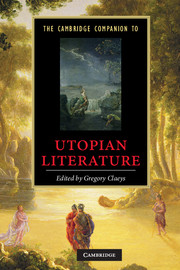Book contents
- Frontmatter
- Part I History
- 1 The concept of utopia
- 2 Thomas More’s Utopia: sources, legacy, and interpretation
- 3 Utopianism after More: the Renaissance and Enlightenment
- 4 Paradise transformed: varieties of nineteenth-century utopias
- 5 The origins of dystopia: Wells, Huxley and Orwell
- Part II Literature
- Further reading
- Index
5 - The origins of dystopia: Wells, Huxley and Orwell
from Part I - History
Published online by Cambridge University Press: 28 September 2010
- Frontmatter
- Part I History
- 1 The concept of utopia
- 2 Thomas More’s Utopia: sources, legacy, and interpretation
- 3 Utopianism after More: the Renaissance and Enlightenment
- 4 Paradise transformed: varieties of nineteenth-century utopias
- 5 The origins of dystopia: Wells, Huxley and Orwell
- Part II Literature
- Further reading
- Index
Summary
Where did it all go wrong? When did the vision of heaven on earth become an anticipation of hell? In many accounts we emerge from the hopeful, dream-like state of Victorian optimism to pass through what H. G. Wells called the age of confusion into a nightmarish twentieth century, soon powerfully symbolized by the grotesque slaughter of the First World War. Enlightenment optimism respecting the progress of reason and science was now displaced by a sense of the incapacity of humanity to restrain its newly created destructive powers. From that time ideal societies have accordingly been more commonly portrayed negatively in dystopian rather than utopian form. Like most other parts of terra utopus, however, the concept of dystopia has been much contested, many eutopias or ideal societies having dystopic elements and vice versa. Dystopias are often described as 'conservative', though they may in fact be sharply critical of the societies they reflect, as we will see. 'Dystopia' is often used interchangeably with 'anti-utopia' or 'negative utopia', by contrast to utopia or 'eutopia' (good place), to describe a fictional portrayal of a society in which evil, or negative social and political developments, have the upper hand, or as a satire of utopian aspirations which attempts to show up their fallacies, or which demonstrate, in B. F. Skinner's words, 'ways of life we must be sure to avoid' - in the unlikely event that we can agree on particulars. Yet as we will see, the most famous exemplar of the genre, Orwell's Nineteen Eighty-Four, was not intended to be anti-utopian as such.
- Type
- Chapter
- Information
- The Cambridge Companion to Utopian Literature , pp. 107 - 132Publisher: Cambridge University PressPrint publication year: 2010
- 36
- Cited by



